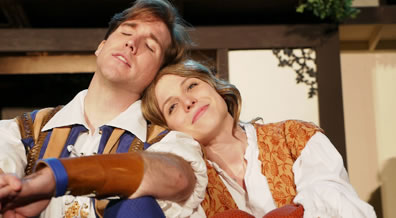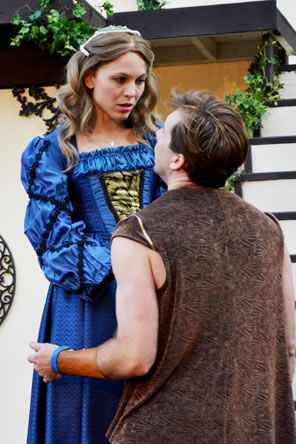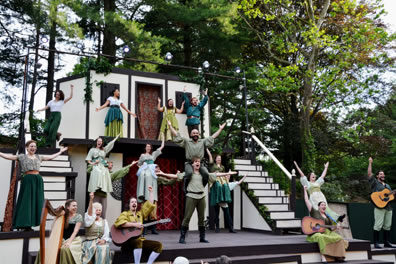As You Like It
What Love's Got to Do with It
Ohio Shakespeare Festival, Stan Hywet Hall, Akron, Ohio
Saturday, July 8, 2017, "Preferred Seating," fourth row center amphitheater seating
Directed by Terry Burgler

Orlando (Ryan Zarecki, left), and Rosalind (Tess Burgler), in her disguise as Ganymede, are many fathom deep in love with each other in the Ohio Shakespeare Festival's production of William Shakespeare's As You Like It. Photo by Bernard Bygott, Ohio Shakespeare Festival.
In As You Like It, William Shakespeare offers no stage direction for Celia and Rosalind when, in the Forest of Arden where Rosalind is disguised as the boy Ganymede, Orlando appears, walking and talking with Jaques. Orlando is Rosalind's crush. She tells Celia, “Slink by and note him,” and per stage tradition the two women slip off to the back or side of the stage, though I’ve never seen them actually “slink.” Nor do I often see Rosalind do much “noting” of Orlando during his following exchange with Jaques.
Tess Burgler in the Ohio Shakespeare Festival’s production, however, does a lot of noting. Her eyes glisten with lust as she looks again upon this male specimen she’s met only once, a meeting in which she became so smitten she gave him the chain around her neck and blatantly risked the wrath of her dukedom-usurping uncle, who consequently banished her as he previously did her father. Now, Rosalind's infatuation grows all the more as she hears Orlando (Ryan Zarecki) admit to writing love sonnets to her and attaching them to the trees in the forest. “Rosalind is your love’s name?” asks Jaques (Geoff Knox). “Yes, just,” Orlando replies, Zarecki in a reverie of his own. “I do not like her name,” Jaques says. “There was no thought of pleasing you when she was christened,” Orlando zings back. A man with good humor and wit! Go on! “What stature is she of?” Jaques asks. Replies Orlando, “Just as high as my heart,” and behind him Burgler’s Rosalind falls over and looks at Celia (Sarah Coon) with a gesture of, “OMG, is he not perfect?”
Perfect, indeed. And in tone and fundamental focus as a romantic comedy, so is this production of As You Like It, helmed by Ohio Shakespeare Festival Co-Artistic Director Terry Burgler. It’s also perfect in setting on the grounds of the Stan Hywet Hall and Gardens, the company's outdoor venue in Akron. About 350 chairs (sold out on this night) face a small stage in the corner of a meadow. To the left rising up the hill is Hywet Hall's teahouse, a towering veranda of stone; though not part of the playing space, it provides a visual juxtaposition of court and country. Behind the seating are ponds and a brook with a bridge leading to grassy banks for picnicking. A gentle breeze provides all the air conditioning we need on a July night.
The theater's setting plays into the script. When the wrestler Charles (Joe Pine) tells Oliver (Dean Coutris) the news at court—how the Duke Frederick usurped his older brother, who, with many noblemen followers, has taken up residence in the Forest of Arden—Charles and Oliver look to the forest of trees beyond the ponds and the path leading to the theater. That exiled Duke Senior (David McNees) later describes their happy life in Arden, where "this our life, exempt from public haunt, finds tongues in trees, books in the running brooks, sermons in stones, and good in everything." And everything is right there: the trees, the running brooks, the stones of the teahouse pavilion—and all is good.
Especially the tongues on the stage. This production's most important line is not about nature but human nature: "O coz, coz, coz, my pretty little coz," Rosalind says to her cousin Celia, "that thou didst know how many fathom deep I am in love! But it cannot be sounded. My affection hath an unknown bottom, like the Bay of Portugal." Tess Burgler delivers this line while lying in a heap on the stage. She arrives at that position when, disguised as Ganymede and pretending to be Rosalind in a game with Orlando, he kisses her on the cheek in sport as he departs and she sinks to the ground in astonished ecstasy. Burgler's Rosalind is a woman truly many fathoms deep in love.
This simple fact dictates the play's romantic plot. In synoptic outline form, As You Like It is one of Shakespeare's silliest outings. However, played with the real emotion of Rosalind and Orlando falling head-over-heels in love with each other at first sight, the plot takes a logical progression. At the same time his love for her grows in absence, her love for him grows in his presence. She cannot drop her disguise as Ganymede for the safety of herself and Celia in their new residency in Arden; on the other hand, she can't keep her hands off Orlando (literally, in Burgler's performance) when he's right there. So, she devises the game of curing Orlando of his lovesickness by pretending to be his love and portraying a woman "changeable, longing and liking, proud, fantastical, apish, shallow, inconstant, full of tears, full of smiles, for every passion something and for no passion truly anything" (in other words, she'll be portraying her own self). Only when the disguise proves more problematic than purposeful—with Orlando giving up the game, Celia and Oliver about to marry, and Rosalind as Ganymede having to fend off the crush of Phoebe the shepherdess—does Rosalind seek a means to revert to her real identity, and in doing so marry Orlando.
Director Terry Burgler's laser focus on the romantic path of the plot starts with casting his daughter (Tess is also Ohio Shakespeare Festival's managing director) as Rosalind. Stiff and formal in her first appearance at court, she becomes giddily uncertain upon meeting Orlando, who has come to the court to wrestle Charles, and then fierce in the face of her uncle, Duke Frederick (Katie Zarecki), when he banishes her. But in Arden, especially after she learns that Orlando is in the neighborhood, Burgler's Rosalind flourishes as a romantic character in which her every fiber is vibrating with the sight, the sound, the mere thought of Orlando.
Which means you have to have an Orlando who can inspire such good vibrations. Many productions have found this too much of a hurdle, for Orlando can seem such a clueless wuss in Shakespeare's script. I once had a conversation with an actress in which we bandied the question, which part did Richard Burbage play in the original production of As You Like It (most likely in 1599)? Not Orlando, we both agreed, though it is the play's male lead, and there is a gap of his presence on stage, typical of the "Burbage break" Shakespeare seemed to give his lead actor in so many of his scripts. Turn the question around, however—did Burbage play Orlando?—and the answer could very well be in the performance of Ryan Zarecki in this production.
A good-looking hunk with a personable expressiveness and quiet confidence, Zarecki uses the play's opening speech to grab the reins of the play, fully establishing his character as "gentle, never schooled and yet learned, full of noble device, of all sorts enchantingly beloved," which is how his spiteful oldest brother, Oliver, describes him. With such a description from one who loathes him, what chance does Rosalind have when she first encounters Orlando? Just as important, Zarecki does not make his opening speech merely expository as he complains about Oliver's treatment of him; he also finds nuggets of comic gold in the lines and shares them with the audience. "His horses are bred better, for besides that they are fair with their feeding, they are taught their manage, and to that end riders dearly hired [laughter]; but I, his brother, gain nothing under him but growth, for which his animals on his dunghills are as much bound to him as I [laugh]." Endearingly smart, Zarecki's Orlando is also comic to the core.
So is the whole play. Terry Burgler is dedicated to text-centric presentations devoid of any imposed contextual layering (Costume Designer Marty LaConte dresses the characters in traditional Elizabethan clothes), and he gets his cast to deliver the play's comic elements so adroitly that diaphragms get quite a workout among the audience of which I estimate at least half were not familiar with the play.
The comedy is contextual. Amiens, played by Jason Leupold as a courtly peacock even in Arden exile, gives a hilarious description of Jaques lamenting the deer, which proves to be an exaggeration of Knox's portrayal of the melancholic. On the other hand, Knox gives a spot-on impersonation of Andrew Gorell's Touchstone as he describes meeting the fool in the forest.
The comedy is textual. Even Adam (Pete Robinson) is funny as the 80-year-old man desiring to accompany Orlando into exile, describing himself as "strong and lusty" having avoided "hot and rebellious liquors in my blood" during his youth. Later, when Orlando defiantly revives Adam from a near-death state after their long journey to Arden, Zarecki and Robinson play the passage for laughs. Laughter accompanies Knox's delivery of Jaques' seven ages of man speech, from "mewling and puking" in the first age to the "big manly voice turning again toward childish treble" in the sixth—but there are no laughs for the last age of "mere oblivion" as Knox turns the dial of his delivery to sardonic pessimism.
The comedy is character-driven, Knox's Jaques being a prime example. Yes, Jaques is a melancholic, perhaps the ancestor to Malvolio in Twelfth Night, which Shakespeare would write a couple years later. However, he's also treated with loving humor by the other characters (or, in the case of Orlando, barely respectful patience), and Knox plays Jaques right into the butt of his fellows' jokes. Mark Stoffer turns the minor character LeBeau into a fixture in memory with the way his preening courtier works every line to visual effect. In warning Orlando to leave the court in the wake of Duke Frederick's fury upon learning that Orlando is the son of one of his enemies, LeBeau notes that Orlando has "deserved high commendation, true applause, and love," upon which Stoffer daintily claps three times.

The romance of Rosalind (Tess Burgler) and Orlando (Ryan Zarecki) in Ohio Shakespeare Festival's production of Shakespeare's As You Like It takes hold in their first meeting with each other, as Rosalind, still living in the court before her banishment, greets Orlando who has come to wrestle the duke's champion. Photo by Scott Custer, Ohio Shakespeare Festival.
Another performance highlight is that of Trevor Buda playing Silvius, the young shepherd smitten with Phoebe (Lara Mielcarek) who wants nothing to do with him (instead, she falls for Ganymede and even uses Silvius to deliver a love letter to the supposed boy that is Rosalind). Buda's Silvius is so ridiculously passionate in his first appearance that he leaves a wake of laughter as he darts off the stage crying "O Phoebe, Phoebe, Phoebe." But he proves deeper than this first impression—in fact, he is a mirror to Rosalind in displaying the effects of all-encompassing infatuation, even sinking to the stage upon hearing Phoebe's letter to Ganymede. Buda's portrayal of Silvius's honest heart and his puppy-dog devotion win the audience to his side.
The comedy is visual. Charles, stripping off his shirt for the wrestling match with Orlando, shows off his impressive work of a body and flexes his pecs for the audience. It's a disgusting thing to see (especially as I'm one without such pecs), but it's funny, too.
The comedy is, as well, interactive. Audience engagement is ongoing, including eye contact, direct address, and even some back-and-forth repartee. Such audience interaction is an element of every role, but the principal character in this activity, of course, is Touchstone. Gorell plays him as a classic fool in the tradition of Elizabethan comics, working the audience and even going off script. When he and the old shepherd Corin (Karen L. Wood) play their court vs. country scene while fishing at the stage's trapdoor (from which a giant trout leaps out to kiss Touchstone), Gorell comments, "This is like a Gallagher concert."
This production clocks in at just over two hours, but with no discernable cuts in the text, and other than Gorell's in-the-moment asides, the only notable directorial interpolation is Charles at play's end arriving in Arden and greeting Orlando. This harmless departure from the script fits in with Terry Burgler's intent to carry this romantic comedy to the happiest of endings, one that includes four marriages, the bad guy (Duke Frederick) turning religious and restoring everybody's estates, and Phoebe realizing she has a good thing in Sylvius. Even Jaques departing to join the now-converted Duke Frederick can't cast a pall on these proceedings, offering his blessings on all the couples with winking satire.
Early on, this production pulls the curtain on one of the play's most important lines, one that, though spoken in every staging of As You Like It I've attended, I've never heard so distinctly delivered as in this. It comes when Celia tries to cheer up Rosalind during their first scene in the play. "You know my father hath no child but I, nor none is like to have, and truly when he dies thou shalt be his heir, for what he hath taken away from thy father perforce, I will render thee again in affection." In Coon's reading, this is no glib promise or sweet expression of sisterly love but an earnest declaration establishing the dukedom's heir, though spoken in private. Burgler's Rosalind takes it so, for when she reacts with astonished disbelief, Celia says, "By mine honor, I will!" This is serious, and everything about their relationship through the rest of the play, particularly Celia's absolute and courageous loyalty to Rosalind, builds from this single line.
It's a little thing, perhaps, a single line in a passing moment. But such are the nuggets embedded in Shakespeare's pastoral landscape of romantic comedy that the Ohio Shakespeare Festival uses to construct a theater of gold.
* * *

With a hearty "Huzzah!" company members of the Ohio Shakespeare Festival finish a number in its Greenshow preceding its production of William Shakespeare's As You Like It on an outdoor stage (set designed by Terry Burgler) at the Stan Hywet Hall & Gardens in Akron. Photo by Scott Custer.
Then there's the theater of green, too.
Ohio Shakespeare Festival precedes its productions with its Greenshow, but this is much more than a warm-up act featuring a handful of interns. Directed by Sarah Coon, this is a full-on, half-hour production featuring most of the cast, all dressed in green, country peasant clothes of lore (designed by Kelsey Tomlinson) and performing Irish jigs and shanties (Jason Leupold is the music director). The accompaniment is guitars, cello, harp, flute, banjo, and various percussion instruments. As they sing and act out the shanties, the company perform precisely choreographed dances, including, in "The Night Pat Murphy Died," one of the actors playing the corpse being dragged, carried, and waltzed about the stage. Each number ends with the cast shouting a hearty "Huzzah!"
Joe Pine (Charles the Wrestler in the play and the company's technical director) and Ryan Zarecki (Orlando and the company's fight director) do a stage combat demonstration which serves as a promotion for the Ohio Shakespeare Festival's fall production of The Three Musketeers: An Adventure, With Music. One of their fight moves ends up with the two competitors clasped around each other's waists and rotating feet to hands across the stage, astonishingly acrobatic and visually hilarious—what another cast member on the stage says "looks like a hermit crab" (between and during songs and skits, the other performers are constantly whizzing one-liners about what's happening on stage). The company's upcoming production of Shakespeare's The Winter's Tale gets its plug in a satirical take on The Chainsmokers' hit "Closer" with lyrics stating the case for staging a play that's not a straightforward comedy or a famous tragedy—"and it's not just for the grants."
I'll offer a further reason for attending The Winter's Tale: Go for the Greenshow and stay for the play.
Eric Minton
July 21, 2017
Comment: e-mail editorial@shakespeareances.com
Start a discussion in the Bardroom



 Find additional Shakespeareances
Find additional Shakespeareances